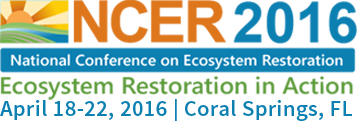Plenary Descriptions
Tuesday, April 19, 2016
| 8:00 AM | Opening Remarks – Conference Co-Chairs , ARCADISAndrew (Andy) LoSchiavo, Adaptive Management Coordinator and Senior Biologist, Planning and Policy Division, Environmental Branch, South Florida Section, U.S. Army Corps of Engineers - Jacksonville District, Jacksonville, FL |
| 8:10 AM – 8:20 AM |
Welcome Address – Jack Payne, UF/IFAS, Vice President for Agriculture and Natural Resources |
| 8:20 AM – 10:00 AM | The Restoration Story Part One: Setting the Stage – Federal and State Large Scale Ecosystem Restoration: Implementation, Political Challenges and Lessons Learned |
Session Description
This session will facilitate dialogue between the Federal and State representatives of several large-scale ecosystem restoration efforts, including the Everglades, Louisiana’s coastal area, the Great Lakes, Chesapeake Bay and the California Delta. Implementation of these programs has identified a number of lessons learned related to improved cooperation at the State and Federal levels while dealing with implementation and political challenges. The challenges are numerous, including both programmatic and project-specific, technical and policy, budgetary, and organizational. Programmatic challenges include implementing a comprehensive restoration effort with multiple interdependent projects while still developing and revising guidance at the highest levels of government – for example, funding, coordination, and maintaining science programs to support restoration planning, implementation, and accountability in supporting decision-making and communication of restoration results and options for improvements. Inherent cultural differences and organizational structures between implementing partners have made communication and collaboration vital in overcoming implementation challenges. Attendees will learn what challenges have been addressed and find out more about the direction of future restoration programs to confront challenges and/or implement recent lessons learned.
Organizer
Andrew (Andy) LoSchiavo, Adaptive Management Coordinator and Senior Biologist, Planning and Policy Division, Environmental Branch, South Florida Section, U.S. Army Corps of Engineers - Jacksonville District, Jacksonville, FL
Facilitator
Donald Boesch, Professor of Marine Science and President, University of Maryland Center for Environmental Science, Cambridge, MD
Panelists
Shannon A. Estenoz, Director, Office of Everglades Restoration Initiatives, U.S. Department of the Interior, Davie, FL
Rainer Hoenicke, Deputy Executive Officer, Science Program, Delta Stewardship Council, Sacramento, CA
Alan D. Steinman, Director, Robert B. Annis Water Resources Institute (AWRI), Grand Valley State University, Muskegon, MI
Ann Swanson, Executive Director, Chesapeake Bay Commission, Annapolis, MD
Mark R. Wingate, Deputy District Engineer for Programs and Project Management Executive Office, New Orleans District, U.S. Army Corps of Engineers (USACE), New Orleans, LA
Wednesday, April 20, 2016
| 8:00 AM – 10:00 AM | The Restoration Story Part Two: Linking Science to Decision Making & Governance |
Session Description
This session will facilitate dialogue between individuals with diverse perspectives on linking science to decision-making. The panel objectives are to highlight cases in which science has successfully supported decision making, illustrate why science and adaptive management are essential to restoration, and highlight the need to effectively communicate science to decision makers and the public. Panelists will share their stories and successes about using scientific data and analysis to inform decision-making in national-level restoration and management programs, including: the Rangeland Fire Management Strategy which entails multi-partner efforts to restore the sagebrush steppe; the Great Lakes Restoration Initiative, the federal program to fund protection and restoration of the Great Lakes ecosystem; nutrient and hydrologic restoration strategies for Everglades recovery; and Minute 319, a creative approach to modifying Mexico-U.S. hydro-relations over the Colorado River. Development of these project plans has yielded numerous lessons learned about integrating science into the governance process at the state, national, and international level.
Facilitator
Neil Santaniello, Florida Atlantic University (FAU), School of Communication and Multimedia Studies, Boca Raton, FL
Organizers
Nicholas G. Aumen, Regional Science Advisor - South Florida, US Geological Survey, Davie, FL -and-
Matt Grabau, Sonoran Institute, Tucson, AZ
Panelists
Alyssa Dausman, Science Director, Gulf Coast Ecosystem Restoration Council, Bay Saint Louis, MS
Suzette M. Kimball, Director, US Geological Survey, Reston, VA
Susan Newman, Senior Scientific Section Lead, Everglades System Assessment Section, South Florida Water Management District (SFWMD), West Palm, FL
Jennifer Pitt, Director, Colorado River Project, National Audubon Society, Boulder, CO
Mike Shriberg, Great Lakes Regional Executive Director for the National Wildlife Federation, Merrifield, VA
Thursday, April 21, 2016
| 8:00 AM – 10:00 AM | The Story Continues: Ecosystem Restoration as a Tool for Enhancing Resiliency and Ecosystem Services |
Session Description
Resiliency is an evolving topic. This session of invited experts will examine where science has moved from theoretical to practical applications in preparing for climate change. We will examine what questions we have been asking about resiliency, find out if we have progressed toward answers, and identify what new questions we should be asking. What is being done at the federal level? How are we prioritizing what is restored and what is not? Panelists will further discuss the role of quantifying benefits and valuing of ecosystem services to advance funding of restoration projects as we prepare for a more resilient future.
Facilitator & Organizer
Carl D. Shapiro, Chief, Science and Decisions Center, U.S. Geological Survey, Reston, VA
Panelists
Sarah Ryker, Acting Deputy Assistant Secretary for Water and Science, Department of the Interior, Washington D.C. Metro Area
Susan Wachter, Albert Sussman Professor of Real Estate, and Professor of Finance at The Wharton School of the University of Pennsylvania; Director for the Wharton GeoSpatial Initiative and Lab; Co-director, Penn Institute for Urban Research; and Co-director, Spatial Integration Laboratory for Urban Systems at the University of Pennsylvania
David Waggonner, President, Waggonner and Ball, New Orleans, LA
Lisa Wainger, Research Professor, University of Maryland, Center for Environmental Science, Solomons, MD

